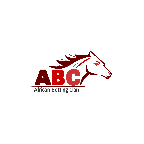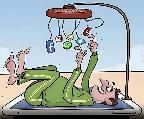Irish Recession bites
- Don
-
 Topic Author
Topic Author
- New Member
-

- Thanks: 0
Irish Recession bites
14 years 5 months ago
www.bbc.co.uk/news/world-europe-12682680
17 March 2011 Last updated at 07:01 Share this pageFacebookTwitterShareEmailPrint
Irish racehorses led to slaughter as recession bites
By Rebecca Morelle
BBC News
Trainer Tom Hogan describes how the recession has hit his racehorse yard
Riding Out the Recession
'Horse cruelty rise' in recession
Rise in abandoned horses in Donegal
Trainer Tom Hogan watches his racehorses as they are put through their paces on the gallops.
He nods with approval as they thunder past, their coats glistening in the morning sunshine.
But back in the yard, it is a different story: row upon row of stables stand empty.
In a few years, he has gone from having 80 horses to just 25 in full-time training.
Like many trainers, he has had to bear the brunt of a problem that has swept through the Irish Republic's racing industry.
Celtic Tiger
Once only affordable to the wealthy few, owning a racehorse suddenly became possible for a far greater number during Ireland's boom times.
The number of thoroughbreds increased during the boom
To keep up with this new demand, thoroughbreds - a breed of horse used specifically for racing - were being produced at an unprecedented rate: between 2000 and 2007, the number of registered foals increased from 8,793 to 12,633.
But these horses are expensive, costing approximately 17,000 euros (£15,000) a year to keep.
And when Ireland plunged into one of the deepest recessions to hit the eurozone, they became a luxury very few could afford.
Mr Hogan, who is based in Nenagh, County Tipperary, explains: "Quite a lot of those horses would have been owned by syndicates - basically blocklayers, carpenters, electricians - people involved in the big property boom. And they just disappeared overnight."
Suddenly he was left with horses, but with no money coming in from their owners to pay for them.
It has been a very difficult time, he says. Some of these horses have had to be exported, others retrained, and a few he has kept on himself. Some, though, have had to be put down.
Growth industry
The loss of healthy thoroughbreds has become a harsh reality of this economic crisis.
And abattoirs, where horses are slaughtered for their meat for human consumption, have become a growth industry.
Continue reading the main story
“
Start Quote
When horses came to the end of their time... there should be euthanasia”
Shane O'Dwyer
ITBA
In 2008, there was just one in the Republic of Ireland, but today there are five.
Last year, 9,790 horses were killed in them. Of these, the BBC has learnt that 4,618 were thoroughbreds.
But this is not the whole picture. Figures are not available for the number of horses that have ended up in Ireland's 40 registered knacker's yards.
Shane O'Dwyer, from the Irish Thoroughbred Breeders' Association (ITBA), acknowledges that there was over-breeding at the height of the Celtic Tiger boom but he believes for many owners, putting horses down was the responsible thing to do.
"We said when horses came to the end of their time or when there was no use to them, there should be euthanasia, voluntary euthanasia… rather than leaving the horse out in the field to be a welfare case."
Equine welfare
But racehorses are the tip of a much larger equine welfare problem in Ireland.
Animal sanctuaries have been taking in growing numbers of horses
At the ISPCA's animal rescue centre in Keenagh, County Longford, they are struggling to cope with the numbers of horses they have had to take in.
"We're seeing every shape and size, from little ponies right up to cobs and draught horses," says Conor Dowling, the ISPCA's chief inspector.
"So far this year, our inspectors have taken in nearly as many equines as we did in the entire year of 2010."
He says that all sections of the equine community were irresponsible.
"We have a serious problem here and we need to find a solution. We all appreciate money is tight in every area of the country, but this situation involves living creatures and we can't allow this to go on."
No easy solution
The ISPCA has suggested a mass cull may be needed to drive Irish horse numbers back down to a manageable size.
Continue reading the main story
“
Start Quote
All other racing jurisdictions around the world are funded by a direct link with betting”
Brian Kavanagh
Horse Racing Ireland
It has also called for better regulation across the industry.
But Brian Kavanagh, chief executive of Horse Racing Ireland, says regulating breeding is not the answer for thoroughbreds.
He says: "If somebody wants to breed a horse, it's very, very difficult to stop them. Everybody looked at the idea of regulation and the reality is the market is regulating it now but it's regulating it in a very, very severe and harsh manner. "
Many, like Tom Hogan, think that more money needs to be pumped into racing through raising betting tax.
Mr Kavanagh agrees: "All other racing jurisdictions around the world are funded by a direct link with betting.
"We would be very supportive of that. We've been lobbying for some time, but the devil is in the detail as to how it's actually worked out but it's definitely a positive development."
For now, though, it seems that economics will continue to dictate the fate of Ireland's racehorses.
The question is whether anything will be put in place to prevent such over-breeding from happening again.
17 March 2011 Last updated at 07:01 Share this pageFacebookTwitterShareEmailPrint
Irish racehorses led to slaughter as recession bites
By Rebecca Morelle
BBC News
Trainer Tom Hogan describes how the recession has hit his racehorse yard
Riding Out the Recession
'Horse cruelty rise' in recession
Rise in abandoned horses in Donegal
Trainer Tom Hogan watches his racehorses as they are put through their paces on the gallops.
He nods with approval as they thunder past, their coats glistening in the morning sunshine.
But back in the yard, it is a different story: row upon row of stables stand empty.
In a few years, he has gone from having 80 horses to just 25 in full-time training.
Like many trainers, he has had to bear the brunt of a problem that has swept through the Irish Republic's racing industry.
Celtic Tiger
Once only affordable to the wealthy few, owning a racehorse suddenly became possible for a far greater number during Ireland's boom times.
The number of thoroughbreds increased during the boom
To keep up with this new demand, thoroughbreds - a breed of horse used specifically for racing - were being produced at an unprecedented rate: between 2000 and 2007, the number of registered foals increased from 8,793 to 12,633.
But these horses are expensive, costing approximately 17,000 euros (£15,000) a year to keep.
And when Ireland plunged into one of the deepest recessions to hit the eurozone, they became a luxury very few could afford.
Mr Hogan, who is based in Nenagh, County Tipperary, explains: "Quite a lot of those horses would have been owned by syndicates - basically blocklayers, carpenters, electricians - people involved in the big property boom. And they just disappeared overnight."
Suddenly he was left with horses, but with no money coming in from their owners to pay for them.
It has been a very difficult time, he says. Some of these horses have had to be exported, others retrained, and a few he has kept on himself. Some, though, have had to be put down.
Growth industry
The loss of healthy thoroughbreds has become a harsh reality of this economic crisis.
And abattoirs, where horses are slaughtered for their meat for human consumption, have become a growth industry.
Continue reading the main story
“
Start Quote
When horses came to the end of their time... there should be euthanasia”
Shane O'Dwyer
ITBA
In 2008, there was just one in the Republic of Ireland, but today there are five.
Last year, 9,790 horses were killed in them. Of these, the BBC has learnt that 4,618 were thoroughbreds.
But this is not the whole picture. Figures are not available for the number of horses that have ended up in Ireland's 40 registered knacker's yards.
Shane O'Dwyer, from the Irish Thoroughbred Breeders' Association (ITBA), acknowledges that there was over-breeding at the height of the Celtic Tiger boom but he believes for many owners, putting horses down was the responsible thing to do.
"We said when horses came to the end of their time or when there was no use to them, there should be euthanasia, voluntary euthanasia… rather than leaving the horse out in the field to be a welfare case."
Equine welfare
But racehorses are the tip of a much larger equine welfare problem in Ireland.
Animal sanctuaries have been taking in growing numbers of horses
At the ISPCA's animal rescue centre in Keenagh, County Longford, they are struggling to cope with the numbers of horses they have had to take in.
"We're seeing every shape and size, from little ponies right up to cobs and draught horses," says Conor Dowling, the ISPCA's chief inspector.
"So far this year, our inspectors have taken in nearly as many equines as we did in the entire year of 2010."
He says that all sections of the equine community were irresponsible.
"We have a serious problem here and we need to find a solution. We all appreciate money is tight in every area of the country, but this situation involves living creatures and we can't allow this to go on."
No easy solution
The ISPCA has suggested a mass cull may be needed to drive Irish horse numbers back down to a manageable size.
Continue reading the main story
“
Start Quote
All other racing jurisdictions around the world are funded by a direct link with betting”
Brian Kavanagh
Horse Racing Ireland
It has also called for better regulation across the industry.
But Brian Kavanagh, chief executive of Horse Racing Ireland, says regulating breeding is not the answer for thoroughbreds.
He says: "If somebody wants to breed a horse, it's very, very difficult to stop them. Everybody looked at the idea of regulation and the reality is the market is regulating it now but it's regulating it in a very, very severe and harsh manner. "
Many, like Tom Hogan, think that more money needs to be pumped into racing through raising betting tax.
Mr Kavanagh agrees: "All other racing jurisdictions around the world are funded by a direct link with betting.
"We would be very supportive of that. We've been lobbying for some time, but the devil is in the detail as to how it's actually worked out but it's definitely a positive development."
For now, though, it seems that economics will continue to dictate the fate of Ireland's racehorses.
The question is whether anything will be put in place to prevent such over-breeding from happening again.
Please Log in or Create an account to join the conversation.
- Dave Scott
-

- Administrator
-

- Posts: 44052
- Thanks: 3412
Please Log in or Create an account to join the conversation.
- Sylvester
-

- Platinum Member
-

- Posts: 14258
- Thanks: 1525
Re: Re: Irish Recession bites
14 years 5 months ago
Nope Ngong also has 25 horses total in training now down to 18. Other 7 wandered off in the knuckles mountain range and are missing.
Very sad.
Very sad.
Please Log in or Create an account to join the conversation.
Time to create page: 0.095 seconds



